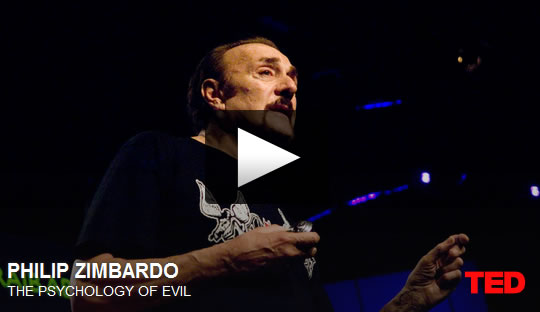Here are 10 of the best talks about psychology from some of the superstars of this and related fields.
1. Philip Zimbardo: The psychology of evil
“Philip Zimbardo knows how easy it is for nice people to turn bad. In this talk, he shares insights and graphic unseen photos from the Abu Ghraib trials. Then he talks about the flip side: how easy it is to be a hero, and how we can rise to the challenge.”
2. Barry Schwartz: The paradox of choice
“Psychologist Barry Schwartz takes aim at a central tenet of western societies: freedom of choice. In Schwartz’s estimation, choice has made us not freer but more paralyzed, not happier but more dissatisfied.”
3. Alison Gopnik: What do babies think?
“Alison Gopnik takes us into the fascinating minds of babies and children, and shows us how much we understand before we even realize we do.”
4. Steven Pinker: Human nature and the blank slate
“Steven Pinker’s book The Blank Slate argues that all humans are born with some innate traits. Here, Pinker talks about his thesis, and why some people found it incredibly upsetting.”
5. Rebecca Saxe: How we read each other’s minds
“Sensing the motives and feelings of others is a natural talent for humans. But how do we do it? Here, Rebecca Saxe shares fascinating lab work that uncovers how the brain thinks about other peoples’ thoughts — and judges their actions.”
6. Elyn Saks: A tale of mental illness — from the inside
“Is it okay if I totally trash your office?” It’s a question Elyn Saks once asked her doctor, and it wasn’t a joke. A legal scholar, in 2007 Saks came forward with her own story of schizophrenia, controlled by drugs and therapy but ever-present. In this powerful talk, she asks us to see people with mental illness clearly, honestly and compassionately.
7. Mihaly Csikszentmihalyi: Flow, the secret to happiness
“Mihaly Czikszentmihalyi asks, “What makes a life worth living?” Noting that money cannot make us happy, he looks to those who find pleasure and lasting satisfaction in activities that bring about a state of “flow.””
8. Dan Ariely: Why we think it’s OK to cheat and steal (sometimes)
“Behavioral economist Dan Ariely studies the bugs in our moral code: the hidden reasons we think it’s OK to cheat or steal (sometimes). Clever studies help make his point that we’re predictably irrational — and can be influenced in ways we can’t grasp.”
9. VS Ramachandran: 3 clues to understanding your brain
“Vilayanur Ramachandran tells us what brain damage can reveal about the connection between celebral tissue and the mind, using three startling delusions as examples.”
10.Elizabeth Loftus: The fiction of memory
“Psychologist Elizabeth Loftus studies memories. More precisely, she studies false memories, when people either remember things that didn’t happen or remember them differently from the way they really were. It’s more common than you might think, and Loftus shares some startling stories and statistics, and raises some important ethical questions we should all remember to consider.”

